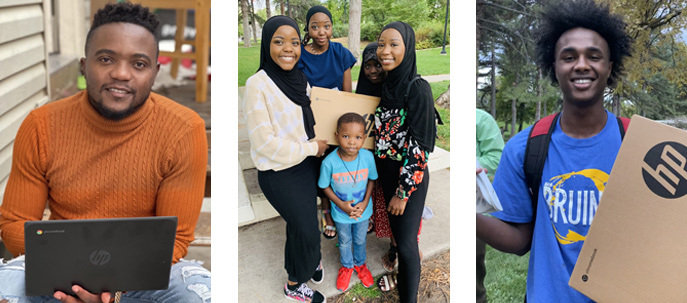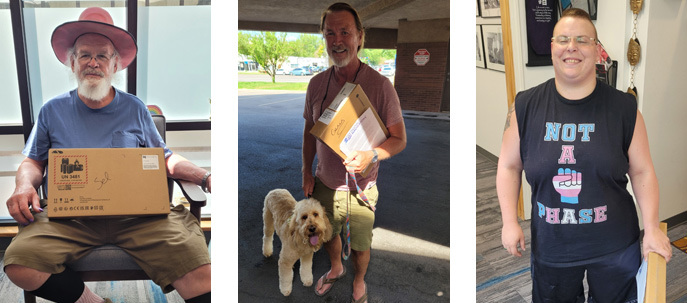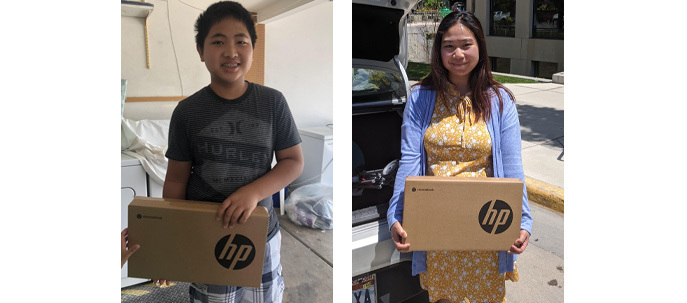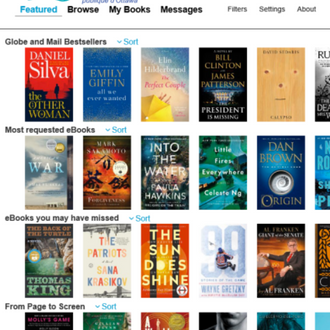How the Digital Navigators Initiative Has Changed Lives in Salt Lake City

For the past year, Salt Lake City Public Library has taken a leading role in piloting the Digital Navigators service model to not only meet local digital needs, but also identify best practices and a framework to inform libraries everywhere.
ULC and the National Digital Inclusion Alliance have served as national partners for SLCPL across this project to raise the visibility of the library's work and lessons learned through blogs, webinars and more. Locally, SLCPL has also partnered with community organizations to reach residents in need, including distributing over 380 devices.
ULC connected with several of the library's local partners to learn more about how this work has helped to change lives across the community. Below are story spotlights from United Africans of Utah, Utah Pride and the Karen Community of Utah.
Spotlight on: United Africans of Utah
United Africans of Utah is dedicated to providing support and creating a forum for the state’s African community at large. Established in 2004, UAU helps to build and develop the capacity of over 20 African community organizations in Utah through networking, education, mentoring and partnership.
Many members of Utah’s African community lack computer literacy skills or the funds to pay for an internet connection. By working with Salt Lake City Public Library through the Digital Navigators initiative, UAU has been able to help address some of these needs in the community by providing computers to college students.
Previously, those students had been relying on their school libraries for the digital tools necessary to complete homework assignments. “We are sure these laptops are going to change their lives because they will be more focused and have easier access to the internet,” said Margaret Mathew, who leads UAU’s community outreach.
UAU sees programs like Digital Navigators as being critical for fostering a stronger and more inclusive workforce and economy. “Giving back to those who currently attend school will increase their education level therefore providing them with better job opportunities in the future,” said Margaret.

Pictured from left to right: United Africans of Utah Chromebook recipients Baracka Mitonzi, Maryan Shire (with family) and Hassan Gabo.
Spotlight on: Utah Pride Center
Utah Pride Center unites, empowers and celebrates the state's diverse LGBTQ+ community by providing a safe and welcoming space for education, partnership, service and events that advance collective health, wellness and success. Among the population that UPC supports, older adults face especially severe challenges to digital access and inclusion.
"LGBTQ+ seniors are twice as likely to be aging alone and four times more likely to never have been married or had a family," shared UPC Director of Adult Programming Deb Hall. Because of the increased isolation that many LGBTQ+ seniors experience, they often don’t have access to the latest devices and — if they do have access — they often don’t know how to use them.
"Many seniors want to conduct business with a person. They want human interaction," said Deb. "Every business, every doctor, every program — they use websites for shopping, placing orders, asking questions. Living in this digital and virtual world, it is imperative to have systems in place for our seniors."
UPC received 10 Chromebooks for distribution through the Digital Navigators initiative, which it provided to seniors and adults who are living on low and/or fixed incomes. Many of the Chromebook recipients previously did not own a device at all.
One of the recipients is not able to read or write, so UPC provided him with speech recognition software that allows him to surf the internet and send emails. This individual lives alone, and his only family member is living with late state dementia. "The Chromebook meant the world to him," said Deb.

Pictured from left to right: Utah Pride Center Chromebook recipients Sel, Gary and Jess.
Spotlight on: Karen Community of Utah
"Right now, the Karen people and every ethnic group in Myanmar are in a desperate time. They’re currently under a military coup and Karen people are facing a civil war," shared Serehdah, a representative of the Karen Community of Utah. "We’re very grateful that we get to come to the U.S. to start our new lives again, though many of us hope to one day return to Kawtholei (Karen land)."
KCU started in 2007, when the majority of Utah's Karen population came to the state. The organization provides a wide range of support for the region's Karen community, including assistance with applying for jobs, food stamps and housing. Every year, KCU holds cultural events including a Karen New Year Celebration and Wrist Tying Ceremony.
Many people in Utah's Karen population are not able to easily use technology, according to Serehdah. Tasks such as opening emails and navigating websites without downloading viruses can easily cause confusion and frustration. Serehdah noted that there is a need for services like Digital Navigators to help teach digital literacy skills in the community.
In addition, many community members lack device access. The Digital Navigators program allowed KCU to support digital needs in the local Karen community by distributing Chromebooks, primarily to students who need the devices for school purposes. For many of these students, the Chromebook is the first digital device they've owned.

Pictured from left to right: Karen Community of Utah Chromebook recipient Than lain and organizational representative Serehdah.
Related Articles

Revisiting 2018 Top Innovators: Offering Express eBooks
Ottawa Public Library
ULC reached out Ottawa Public Library's Ann Archer to follow up and learn about how OPL's eBooks Express program has evolved in the year since its Top Innovator win.
Learn More

The Library’s Role in Bridging the Digital Divide
2U, Inc.
The below blog post examines the impact of the digital divide and how public libraries can work to bridge the gap to create social and racial equity for those within their communities.
